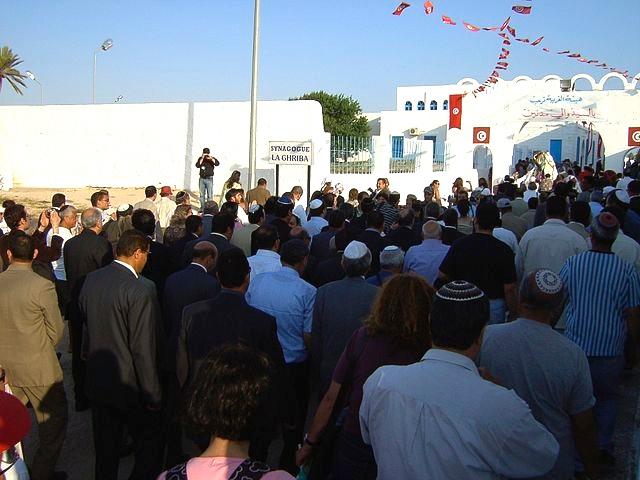Tunisian Jews seek religious tolerance after the revolution
The Lag Ba’Omer procession takes place outside the El Ghriba Synagogue. (Photo by Chesdovi via Wikiemedia Commons.)
Tunisia’s 2011 revolution and the fall of former Tunisian President Zine El Abidine Ben Ali was followed by a new constitution and democratic elections.
A self-described moderate Islamic Party, Ennahda, took power.
But Tunisia’s economy has struggled. Unemployment is high and lagging tourism has set in. That tourism, especially, once benefitted a Jewish community living on the island of Djerba. Without that, and with a grim economy overall many Tunisian Jews are feeling the pressure to migrate, away from a place their ancestors have long called home.
Tunisia is one of the earliest Jewish settlements in the world. In the mid-20th century, more than 100,000 Jews lived there.
Now, fewer than 2,000 Jews live in Tunisia, with most residing on the island of Djerba, where the first Jews settled in the 6th century BCE and founded the El Ghriba Synagogue.
Khodir Haneya, curator of the El Ghriba Synagogue in Djerba, has seen how economic hardship has affected his community.
“Families have left Tunisia. They do not have a job here,” he said.
In the midst of unrest, anti-Semitism is increasing, and during a public appearance by Wajdi Ghoneim, a popular cleric, a crowd of thousands of supporters chanted, “Khaybar, Khaybar, you Jews, the army of Mohammed will return.”
Referring to a battle fought by Prophet Mohammad against the Jews of Khaybar, the chant is a call to renew the war against Jews living in the Arab world.
This wasn’t the first instance of anti-Semitism since Tunisia’s revolution. But, many Tunisian politicians are using their platform to speak out against death threats and anti-Semitic speeches.
Rached Ghannouchi, the head of the Ennahda Party, condemned the death threats, and Moncef Marzouki, the interim president, visited El Ghriba Synagogue on the 10-year anniversary of an al-Qaida attack on the place of worship, to renew his commitment to a more accepting Tunisia.
“We will not tolerate any discrimination against Tunisian Jewish citizens. (The Jews) are an indivisible part of our people,” Marzouki said during his visit.
Selma Baccar, a member of the Democratic Modernist Pole Party in Tunisia’s National Constituent Assembly, says those interpreting Islam to justify violence against the Jews, aren’t part of the Islam she identifies herself with.
“The Islam that I have known and was brought up in taught me how to love it and to feel secure with religion, not to be scared of it. I love Islam and I feel secure with it, it is not imposed on me,” she said. “All of the principles that we learned when we were little, today, in the name of backward ideas, we are pulling away from.”
Roger Bismuth, the leader of the Jewish community in Tunisia, says though Tunisia is battling with economic and cultural problems, Tunisian Jews plan to stay in the country because they identify themselves as Tunisian first, Jews second.
“Firstly, I am Tunisian, 100 percent Tunisian,” he said. “We are Tunisian citizens and we have all the rights and the duties that any citizens has. I am not a minority, in my country — I am equal to anybody.”
Tunisia’s newfound freedom of expression has a minority using their freedom to express anti-Semitism, but the country is upholding it’s tradition of tolerance and coexistence.
The Bureau of Democracy, Human Rights and Labor reported in the 2011 International Religious Freedom Report, that the Tunisian constitution and other laws largely support religious freedom, but the government enforced some restrictions.
Restriction on association have loosened since the revolution and now the government is taking steps to promote interfaith tolerance, by demonstrating a trend toward improving respect for and protection of the right to religious freedom.
During the revolution, the police couldn’t guarantee security, so Tunisians organized local committees to assure one another’s safety.
“The revolution happened and we continued our work,” Haneya said. “We opened the synagogue and the Muslims were even guarding us. Where will you find this scene elsewhere? Absolutely nowhere but Tunisia.”
